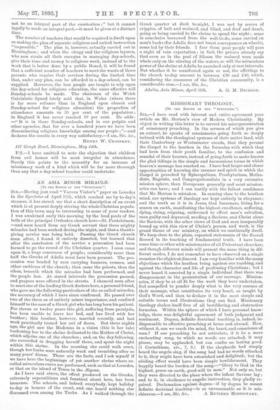MISSIONARY THEOLOGY.
[TO TEE EDITOR OF THE " SPECTATOR." J
SIR,—I have read with interest and entire agreement your article on Mr. Horton's view of Modern Christianity. My object in writing this letter is to correct his misrepresentation of missionary preaching. In the sermon of which you give an extract, he speaks of missionaries going forth so deeply imbued with the theological systems of their native land, with their Canterbury or Westminster creeds, that they present the Gospel to the heathen in the formulas with which they had been from their youth familiar, to the confusion and scandal of their hearers, instead of going forth to make known the glad tidings in the simple and harmonious terms in which heaven's message has reached us. I have bad larger and closer opportunities of knowing the manner and spirit in which the Gospel is preached by Episcopalians, Presbyterians, Metho- dists, Baptists, and Congregationalists in a very extensive mission sphere, than Europeans generally and moat mission- aries can have ; and I can testify with the fullest confidence that Mr. Horton is mistaken. In coming close to the heathen mind, our systems of theology are kept entirely in abeyance; and the truth as it is in Jesus, God Incarnate, living for a season on earth, manifesting the highest excellence, suffering, dying, rising, reigning, enthroned to effect man's salvation, man guilty and depraved, needing a Saviour, and Christ alone the Saviour, with the other views of God and man inseparably bound up with this view of Christ's person and work, is the grand theme of our ministry, on which we continually dwell. We keep close to the plain, repeated statements of the Sacred Record in its teaching of fundamental truth. I have been some time or other with missionaries of all Protestant churches; and though different minds will present the same thing in dif- ferent modes, I do not remember to have observed on a single occasion the slightest .discord. lain very familiar with the many objections which the heathen bring against our teaching, and against the character and life of professing Christians ; but I never heard it asserted by a single individual that there was disagreement in the presentation of our message. Mission- aries, if they be at all fit for the work they have undertaken, feel compelled to ponder deeply what is the very essence of their message, what constitutes its very heart, as taught by God's Word, and then to declare it in the most simple and suitable terms and illustrations they can find. Missionary theology shakes itself free of all bewildering and obstructive formulas. Within the sphere of which I have personal know- ledge, there was delightful agreement of both judgment and sentiment. Dogma, definite doctrinal teaching is, indeed, in- dispensable to effective preaching at home and abroad. How, without it, can we reach the mind, the heart, and conscience of man ? If our preaching be not articulate, if it be a mere enchanting song, to which no words are attached, it may please, may be applauded, but can confer no lasting good. (1 Corinthians, xiv., 7, 8.) If the shepherds had simply heard the angels sing, if the song had had no words attached to it, they might have been astonished and delighted ; but the abiding effect would have been simple bewilderment. They happily heard the burden of the song,—" Glory to God in the highest, peace on earth, good-will to men." Not only so, but they were directed to the place where the infant Saviour lay ; and to it, in obedience to angelic instruction, they gladly re- paired. Declamation against dogma—if by dogma be meant definite doctrinal teaching—is as unreasonable as it is mis-


































 Previous page
Previous page